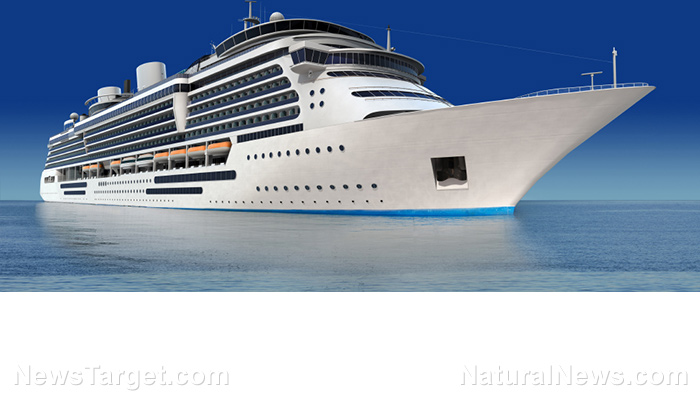Study: Poor air quality on cruise ships may endanger the health of passengers, staff and port communities
04/05/2019 / By Tracey Watson

If the idea of cruising conjures up images of good, clean sea air in your mind, think again. A recent study by a researcher from Johns Hopkins University Bloomberg School of Public Health found that air pollution on board many ships is so high that it endangers the health of passengers, crew and even people living in port communities.
Air quality was inconspicuously measured in three different environments on each of four cruise ships – the Carnival Liberty, Holland America’s MS Amsterdam, the Emerald Princess and the Carnival Freedom — to try to determine how exhaust fumes from each ship might impact air quality on deck.
The study’s author, Ryan David Kennedy, Ph.D., MAES, an assistant professor with Johns Hopkins’ Department of Health, Behavior and Society, took measurements of ultrafine particulate pollution while each ship was on the move at sea when forward momentum would create spaces on the deck that were either upwind or downwind of the ship’s smokestacks.
The results? “Extremely high levels of air pollution” were detected – levels so high, in fact, that they rival some of the world’s most polluted cities, including Santiago, Chile and Beijing, China. (Related: WHO: 9 out of 10 people in the world breathe polluted air.)
Thousands of ships spewing dirty air across the oceans – with dire consequences
Experts estimate that over 30 million people will embark on a cruise somewhere in the world this year. In addition, millions more people work on cruise ships or live in port communities exposed to pollution from cruise ship smokestacks.

This exposure is likely having severely negative effects on the health of these people.
Stand.earth, the environmental organization that sponsored the study, reported that Kennedy chose to measure ultrafine particulate pollution levels on the ships since these particles are even more toxic than fine particle pollution, which has been studied more extensively by scientists:
Ultrafine particles can have thousands of times more surface area than fine particles and are small enough to be inhaled into a person’s lungs and move into the bloodstream, where they can cause higher rates of cardiovascular disease and asthma. Recent studies have suggested that ultrafine particles may be the most dangerous to human health, and that particulate matter from ship exhaust may be to blame for tens of thousands of annual deaths.
What the study found
The reason cruise ships generate such high levels of ultrafine particulate pollution is because they rely on heavy fuel oil (HFO) for power. While most cruise lines have installed scrubbers – an exhaust-cleaning technology which is supposed to reduce sulfur emissions – the study shows that these measures are making hardly any difference to the amount of pollution created by the use of HFO.
Measurements taken on the four ships – all of which belong to the Carnival Corporation – revealed shockingly high levels of ultrafine particle pollution on every single ship.
Stand.earth reported:
- While all four ships were traveling at sea, average particle counts were significantly higher in the areas behind the smokestacks (stern).
- Particle counts on the Holland America MS Amsterdam were approximately eight times higher on the stern areas than on the bow.
- Particle counts on the Carnival Freedom measured as high as 73,621 particles per cubic centimeter (pt/cc) near the running track while at sea.
- Particle counts on the Princess Cruises Emerald Princess measured as high as 157,716 pt/cc on the lower stern while at sea.
In comparison, pollution measurements taken with the same equipment in Beijing, China in 2009 were 30,000 pt/cc on a busy street, and in Santiago, Chile in 2011-2012 were in the ranges of 8,000-30,100 pt/cc.
The study also warned that as much as 70 percent of this pollution was being emitted within 250 miles of land, putting people living in those communities in danger, too.
All things considered, until cruise lines switch to cleaner fuels, those who wish to protect their health might do best to avoid them altogether.
Learn more at Environ.news.
Sources include:
Stand.earth[PDF]
Submit a correction >>
Tagged Under:
This article may contain statements that reflect the opinion of the author





















